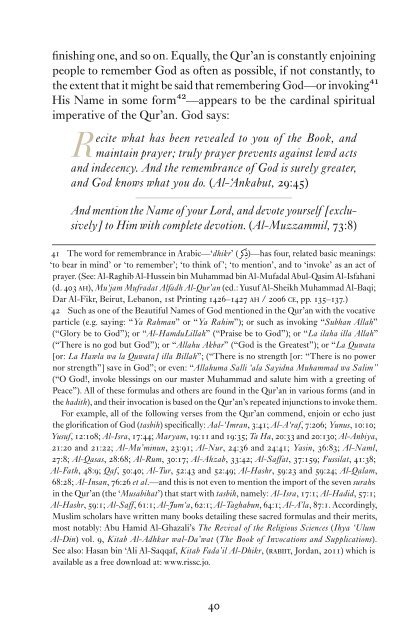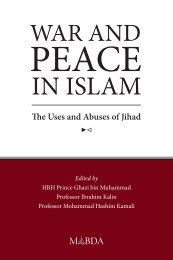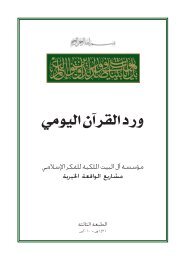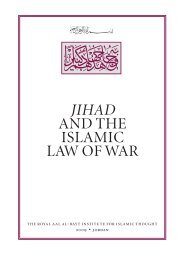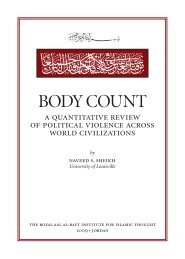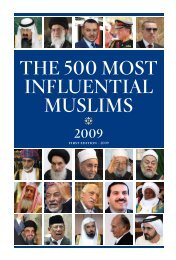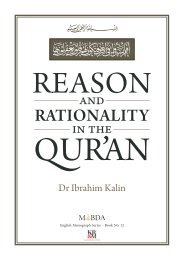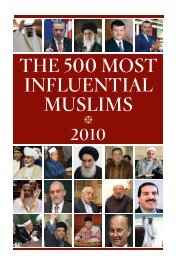You also want an ePaper? Increase the reach of your titles
YUMPU automatically turns print PDFs into web optimized ePapers that Google loves.
finishing one, and so on. Equally, the Qur’an is constantly enjoining<br />
people to remember God as often as possible, if not constantly, to<br />
the extent that it might be said that remembering God—or invoking41<br />
His Name in some form42—appears to be the cardinal spiritual<br />
imperative of the Qur’an. God says:<br />
Recite what has been revealed to you of the Book, and<br />
maintain prayer; truly prayer prevents against lewd acts<br />
and indecency. And the remembrance of God is surely greater,<br />
and God knows what you do. (<strong>Al</strong>-‘Ankabut, 29:45)<br />
And mention the Name of your Lord, and devote yourself [exclusively]<br />
to Him with <strong>com</strong>plete devotion. (<strong>Al</strong>-Muzzammil, 73:8)<br />
41 The word for remembrance in Arabic—‘dhikr’ ( <br />
)—has four, related basic meanings:<br />
‘to bear in mind’ or ‘to remember’; ‘to think of ’; ‘to mention’, and to ‘invoke’ as an act of<br />
prayer. (See: <strong>Al</strong>-Raghib <strong>Al</strong>-Hussein bin Muhammad bin <strong>Al</strong>-Mufadal Abul-Qasim <strong>Al</strong>-Isfahani<br />
(d. 403 ah), Mu‘jam Mufradat <strong>Al</strong>fadh <strong>Al</strong>-Qur’an (ed.: Yusuf <strong>Al</strong>-Sheikh Muhammad <strong>Al</strong>-Baqi;<br />
Dar <strong>Al</strong>-Fikr, Beirut, Lebanon, 1st Printing 1426–1427 ah / 2006 ce, pp. 135–137.)<br />
42 Such as one of the Beautiful Names of God mentioned in the Qur’an with the vocative<br />
particle (e.g. saying: “Ya Rahman” or “Ya Rahim”); or such as invoking “Subhan <strong>Al</strong>lah”<br />
(“Glory be to God”); or “<strong>Al</strong>-HamduLillah” (“Praise be to God”); or “La ilaha illa <strong>Al</strong>lah”<br />
(“There is no god but God”); or “<strong>Al</strong>lahu Akbar” (“God is the Greatest”); or “La Quwata<br />
[or: La Hawla wa la Quwata] illa Billah”; (“There is no strength [or: “There is no power<br />
nor strength”] save in God”; or even: “<strong>Al</strong>lahuma Salli ‘ala Sayidna Muhammad wa Salim”<br />
(“O God!, invoke blessings on our master Muhammad and salute him with a greeting of<br />
Peace”). <strong>Al</strong>l of these formulas and others are found in the Qur’an in various forms (and in<br />
the hadith), and their invocation is based on the Qur’an’s repeated injunctions to invoke them.<br />
For example, all of the following verses from the Qur’an <strong>com</strong>mend, enjoin or echo just<br />
the glorification of God (tasbih) specifically: Aal-‘Imran, 3:41; <strong>Al</strong>-A‘raf, 7:206; Yunus, 10:10;<br />
Yusuf, 12:108; <strong>Al</strong>-Isra, 17:44; Maryam, 19:11 and 19:35; Ta Ha, 20:33 and 20:130; <strong>Al</strong>-Anbiya,<br />
21:20 and 21:22; <strong>Al</strong>-Mu’minun, 23:91; <strong>Al</strong>-Nur, 24:36 and 24:41; Yasin, 36:83; <strong>Al</strong>-Naml,<br />
27:8; <strong>Al</strong>-Qasas, 28:68; <strong>Al</strong>-Rum, 30:17; <strong>Al</strong>-Ahzab, 33:42; <strong>Al</strong>-Saffat, 37:159; Fussilat, 41:38;<br />
<strong>Al</strong>-Fath, 48:9; Qaf, 50:40; <strong>Al</strong>-Tur, 52:43 and 52:49; <strong>Al</strong>-Hashr, 59:23 and 59:24; <strong>Al</strong>-Qalam,<br />
68:28; <strong>Al</strong>-Insan, 76:26 et al.—and this is not even to mention the import of the seven surahs<br />
in the Qur’an (the ‘Musabihat’) that start with tasbih, namely: <strong>Al</strong>-Isra, 17:1; <strong>Al</strong>-Hadid, 57:1;<br />
<strong>Al</strong>-Hashr, 59:1; <strong>Al</strong>-Saff, 61:1; <strong>Al</strong>-Jum‘a, 62:1; <strong>Al</strong>-Taghabun, 64:1; <strong>Al</strong>-A’la, 87:1. Accordingly,<br />
Muslim scholars have written many books detailing these sacred formulas and their merits,<br />
most notably: Abu Hamid <strong>Al</strong>-Ghazali’s The Revival of the Religious Sciences (Ihya ‘Ulum<br />
<strong>Al</strong>-Din) vol. 9, Kitab <strong>Al</strong>-Adhkar wal-Da’wat (The Book of Invocations and Supplications).<br />
See also: Hasan bin ‘<strong>Al</strong>i <strong>Al</strong>-Saqqaf, Kitab Fada’il <strong>Al</strong>-Dhikr, (rabiit, Jordan, 2011) which is<br />
available as a free download at: www.rissc.jo.<br />
40


